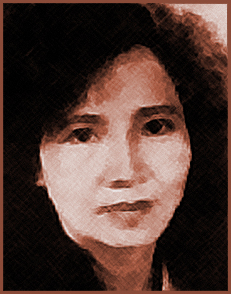
"Happiness always returns to port . . ."
- Duong Thu Huong, Memories of a Pure Spring, 183

"Happiness always returns to port . . ."
- Duong Thu Huong, Memories of a Pure Spring, 183
Born in 1947 near Thai Binh in Central Vietnam, Duong Thu Huong is a prominent novelist and critic of Vietnam's Communist administration. In an essay smuggled out of Vietnam and published in the magazine Dien Dan, Huong writes, "Our ancestors used to say 'gold disappears quickly, only soil stays.' Indeed, the war must have taken away the noblest, the bravest, the most honest. Left behind are the cunning, the beggars, the ones that shout far in the back and pretend to wield their swords just enough to avoid the front line." While celebrating the courage displayed in the struggle for liberation, the author focuses on the loss of idealism in the post-war period and the role of art in society. She writes, "The devastating wars throughout the unfortunate history of Vietnam seem to have exhausted its people of bravery. Like any other characteristics [of human beings], the source of bravery is not limitless."
There is much evidence of this artist's personal courage. At the age of twenty Duong Thu Huong led a Communist Youth Brigade that provided entertainment for the soldiers at the front. She was one of three survivors out of forty volunteers in the group. She was also at the front during China's attacks on Vietnam in 1979. However, in the period after reunification in 1975, Duong Thu Huong has become increasingly critical of the repressive atmosphere created by the Communist government.
Her outspoken criticism of the government has resulted in numerous reprisals. Although a prize-winning screenwriter for the Vietnam Film Company, she lost her job because of her criticism of censorship. Paradise of the Blind, was the first Vietnamese novel to be published in English but its contents resulted in the author's works being banned in Vietnam. When she sent Novel Without a Name overseas for publication, the author was imprisoned without trial for seven months and in 1995 her passport was revoked despite the international attention focused on her work.
Paradise of the Blind
This 1988 novel critiquing the land reforms of 1953 to 1956 resulted in the author's expulsion from the Communist party and a publication ban on her work.
Novel Without a Name
The narrator of this 1991 is a veteran in the Northern army who becomes disenchanted with the war effort and the political leadership. This is a Vietnamese All Quiet on the Western Front describing the horrors of war from the viewpoint of the soldier. The author was imprisoned wihtout trial for seven months for sending this novel abroad for publication.
Memories of a Pure Spring
This novel, published in 2000, is the story of artistic genius and a love born in the time of the struggle for liberation. Both art and love are twisted and corrupted by the strains of life in post-war Vietnam where selfishness, ambition and greed challenge revolutionary ideals.
Beyond Illusions
Published in 2002, this novel is a sympathetic exploration of the responsibilities of the artist in a totalitarian regime and of the personal costs of being true to ideals that challenge people in positions of power.
Bibliography
"Duong Thu Huong." MostlyFiction.com. 1998 - 2003. MostlyFiction.com. 15 July 2003
<http://mostlyfiction.com/world/huong.htm.>
.
Huong, Duong Thu. "The Flapping Noises from a Flock of Crows." Digital Freedom Network. 2002.
Digital Freedom Network. 15 July 2003
<http://www.dfn.org/voices/vietnam/duongflock.htm.>
.
Huong, Duong Thu. Memories of a Pure Spring. New York: Penguin Books, 2001.
Huong, Duong Thu. Novel Without a Name. New York: Penguin Books, 1996.